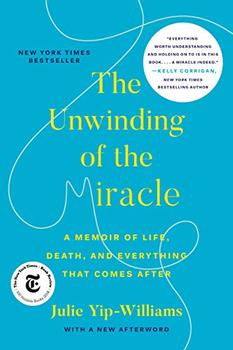Summary | Excerpt | Reviews | Beyond the book | Read-Alikes | Genres & Themes | Author Bio

A Doctor's Story of Love and Loss
by Rachel Clarke"Yet rarely, if ever, is the classical presentation of dying taught at medical school. Small wonder families feel horribly adrift, when even the doctors are ill-equipped to navigate these waters." – Rachel Clarke
The person you knew, perhaps your entire life, is no longer who they used to be.
Showers taken every day are now only twice a week, with the help of a home hospice nurse who comes only for this and other grooming necessities. The other hospice nurse monitors medications and deterioration. Any changes since yesterday? It may be time for a hospital bed to be delivered.
The near-legendary appetite that defined them is practically nil. Favorite foods have been left behind on this final stretch. Late afternoons spent recounting the activities of a classroom, what the students asked and learned, have given way to episodes of Maury and Cash Cab while regret ripples across a sunken face: vacations never taken, more students left to teach.
My father, a devoted and revered business education teacher passed away from colon cancer in May 2019, after nearly three years of chemotherapy and numerous hospital stays. Doctors flit in and out of the room with the barest whispers of updates on any possible progress, and nurses stayed just long enough to establish a momentary rapport. It was enormously lonely, a giant void, because my family and I moved so often over the years that we didn't have a well-established support system.
Reading British doctor Rachel Clarke's memoir about her life and career in palliative care, I felt a sense of the support I wish I'd had then. Dear Life should be in hospital waiting rooms, in chemotherapy clinics, in doctors' offices where the bad news might come today or next week. I am relieved to discover this complete, gentle understanding of what my family and I went through when my father was dying.
Clarke came to palliative care in a fairly roundabout way. She originally planned to write, and then began a career in documentaries, but this work made her feel tired and hollow inside. Her father — a caring, attentive, community-oriented doctor — inspired her to begin her medical career, but it was the experience of fiercely advocating for Pat, her fiancé's dying mother, that sent her out of emergency room work and into palliative care, her true calling.
Clarke begins her deeply informative, touching tour of her work by recalling her first day of medical school. The students were shown the 1999 film adaptation of Margaret Edson's Pulitzer Prize-winning play Wit — loosely based on the playwright's experience working in a hospital with terminal patients — to remind them that their patients are human beings. Despite this patient-focused training, as her career advanced, Clarke was often surprised at how death was shunted to a distant, dusty, unseen corner of the medical profession, and how often doctors displayed appalling bedside manners when discussing terminal diagnoses with patients and their loved ones.
After beginning Dear Life with the personal ordeal of her father dying of colon cancer, Clarke returns to this event toward the end, and it was hard for me to read because it made vivid again those months when my own father was going through much the same thing. But this is what great books are meant to do: Give us a different perspective on our memories, painful as they might be. She describes her documentation of her patients' last moments as "the bleak poetry of human expiration," and that's exactly right. Here was a charismatic lion-father who was at the center of my own life, and then gone.
There is a moment in Dear Life in which Dr. Clarke explains to Simon, a recently retired policeman and new hospice arrival, the kind of pattern that develops in people with a terminal illness. As she outlines the increasing exhaustion and other symptoms, I realized that none of my father's doctors ever explained this in such thoughtful detail. We were left to worry about what was going on with him, to wonder if the increasingly rare days that he seemed to have some energy offered hope that he would get better and prove medical science wrong. Obviously, that never happened, but to find that someone like Clarke understands the experience and cares enough to express it is one of the greatest gifts of Dear Life. It's a gift that provides a little peace from the emotional turmoil that these personal memories can still produce. Clarke is an unassuming healer now for the thousands, or even millions of people that I hope will read this book.
![]() This review
first ran in the September 2, 2020
issue of BookBrowse Recommends.
This review
first ran in the September 2, 2020
issue of BookBrowse Recommends.

If you liked Dear Life, try these:

by Claire Oppert
Published 2024
A celebrated art therapist plays the cello for her patients—and offers a moving reflection on the extraordinary power of music to enrich our lives, all the way to the very end.

by Julie Yip-Williams
Published 2020
As a young mother facing a terminal diagnosis, Julie Yip-Williams began to write her story, a story like no other. What began as the chronicle of an imminent and early death became something much more - a powerful exhortation to the living.
Your guide toexceptional books
BookBrowse seeks out and recommends the best in contemporary fiction and nonfiction—books that not only engage and entertain but also deepen our understanding of ourselves and the world around us.